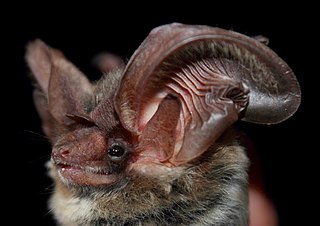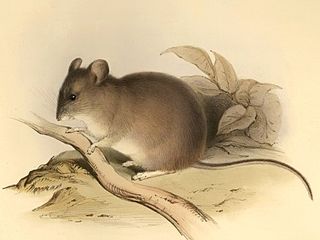
The gray leaf-eared mouse is a rodent species from South America. It is found in Argentina, Bolivia, Brazil and Paraguay; its habitat includes the Gran Chaco.

Allen's big-eared bat is a species of vesper bat in the monotypic genus Idionycteris. It occurs in Mexico and in Arizona, California, Nevada, New Mexico, Utah, and Colorado in the United States.

The big-eared climbing rat is a species of rodent in the family Cricetidae. It is found in Central America from Mexico to Costa Rica.
The friendly leaf-eared mouse is a species of rodent in the family Cricetidae. It is found only in Peru.

Phyllotis is a genus of rodent in the family Cricetidae. These mice are commonly confused with Auliscomys, Graomys and Loxodontomys.. In order to tell these genera apart, one must look at the tail. Species in the genus Phyllotis have a penicillate tip on their tail which is not present in the other two genera. Tails in the genus Phyllotis are also less than the length of its head and body combined whereas in Graomys, tails are longer than the head and body combined. Phyllotis xanthopygus was found at the summit of Volcán Llullaillaco, which is the highest altitude a mammal has yet been found in nature.
The Andean leaf-eared mouse is a species of rodent in the family Cricetidae. It is found in Ecuador and Peru.
The Buenos Aires leaf-eared mouse is a species of rodent in the family Cricetidae. It is found only in Argentina.

Darwin's leaf-eared mouse is a species of rodent in the family Cricetidae.
The definitive leaf-eared mouse is a species of rodent in the family Cricetidae. It is found only in west central Peru, in rocky and shrub-covered areas at elevations between 2600 and 3000 m.
The gerbil leaf-eared mouse is a species of rodent in the family Cricetidae. It is found only in Peru.
Haggard's leaf-eared mouse is a species of rodent in the family Cricetidae. It is found only in Ecuador.
The master leaf-eared mouse is a species of rodent in the family Cricetidae. It is found in Chile and Peru.
Osgood's leaf-eared mouse is a species of rodent in the family Cricetidae. It is found only in the Altiplano of northeastern Chile. The species is named after American zoologist Wilfred Hudson Osgood.
The bunchgrass leaf-eared mouse is a species of rodent in the family Cricetidae. It is found in Argentina, Bolivia, and Peru.
Wolffsohn's leaf-eared mouse is a species of rodent in the family Cricetidae. It is found only in Bolivia.

The yellow-rumped leaf-eared mouse, otherwise known as the Patagonian leaf-eared mouse, is a species of rodent in the family Cricetidae and order Rodentia. It is the most widespread member of the genus.
The Lima leaf-eared mouse or Lima pericote is a species of rodent in the family Cricetidae. It is found in a variety of habitats on the western slopes of the Andes from northern Chile to west-central Peru at elevations from sea level to 4000 m.
Anita's leaf-eared mouse is a species of rodent in the family Cricetidae. It was discovered in Tucumán Province in northwestern Argentina in alder forest of the upper part of the Southern Andean Yungas ecoregion, on the eastern slopes of the Andes. The species is terrestrial and nocturnal, and was named after American zoologist Anita K. Pearson. It appears to be most closely related to the bunchgrass leaf-eared mouse.





